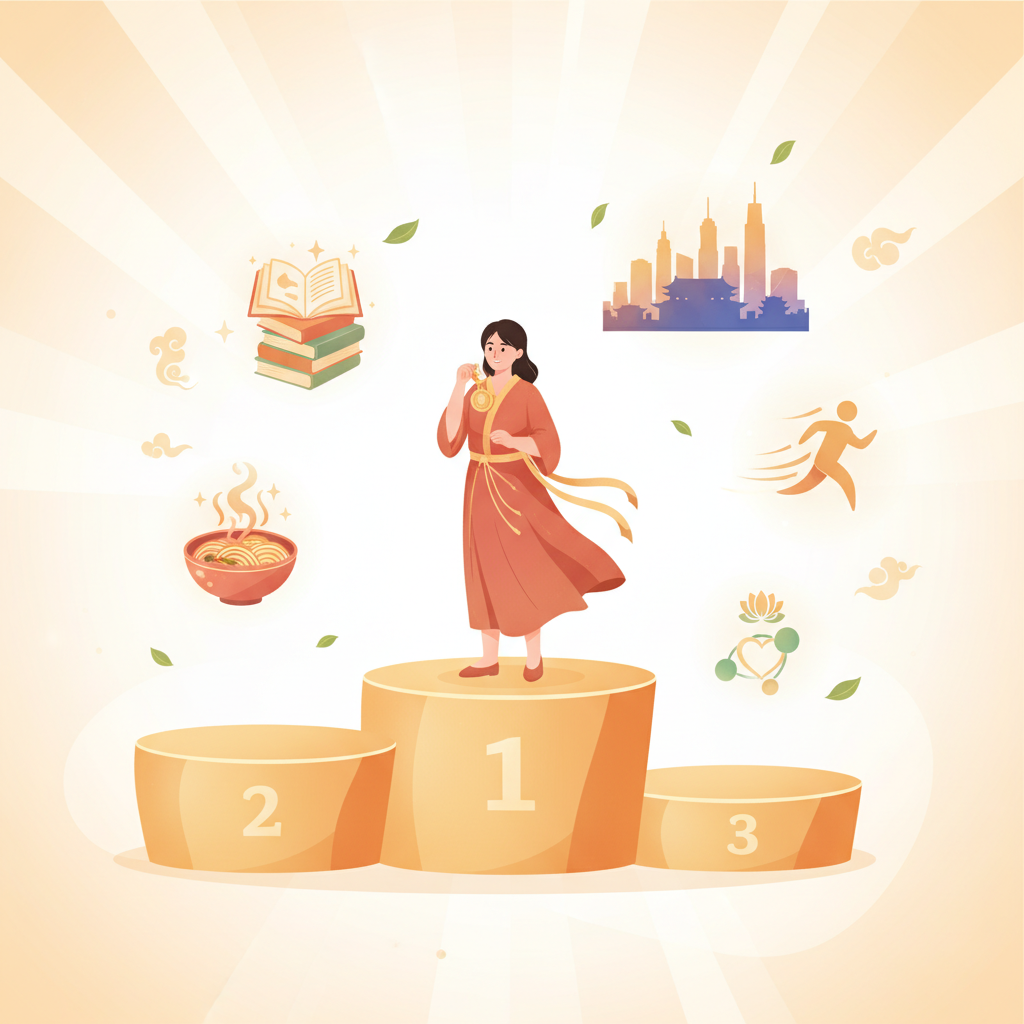Superlative Adverb 最 (zuì) - Expressing "The Most"

🇪🇸 ESPAÑOL
El adverbio de grado 最 (zuì) se utiliza para formar el superlativo, de forma muy parecida a como en español usamos "el/la más..." o terminaciones como "-ísimo/a". Se coloca siempre delante de un adjetivo o de un verbo que exprese un estado mental o sentimiento para indicar que algo o alguien ocupa el primer puesto en esa cualidad dentro de un grupo.
🇬🇧 ENGLISH
The degree adverb 最 (zuì) is used to form the superlative, very similar to how in English we use "the most..." or "-est" endings. It is always placed before an adjective or a verb expressing a mental state or feeling to indicate that something or someone ranks first in that quality within a group.
📚 Key Phrase: 我觉得夏天是最好的季节。 (Wǒ juéde xiàtiān shì zuì hǎo de jìjié.)
Grammar Focus
📝 Grammar Structure | Estructura Gramatical
🇪🇸 ESPAÑOL
Estructura básica con adjetivos:
Sujeto + 最 (zuì) + Adjetivo
Ejemplo: 这本书最有趣 (Zhè běn shū zuì yǒuqù) = "Este libro es el más interesante"
Estructura con verbos psicológicos:
Sujeto + 最 (zuì) + Verbo (喜欢/想/讨厌, etc.)
Ejemplo: 我最喜欢咖啡 (Wǒ zuì xǐhuān kāfēi) = "El café es lo que más me gusta"
Estructura con "de" descriptiva:
Sustantivo + 是 + 最 + Adjetivo + 的
⚠️ Importante: El "的" final enfatiza la descripción
- 夏天是最好的季节 = El verano es la mejor estación
- 你是最聪明的学生 = Tú eres el estudiante más inteligente
🇬🇧 ENGLISH
Basic structure with adjectives:
Subject + 最 (zuì) + Adjective
Example: 这本书最有趣 (Zhè běn shū zuì yǒuqù) = "This book is the most interesting"
Structure with psychological verbs:
Subject + 最 (zuì) + Verb (喜欢/想/讨厌, etc.)
Example: 我最喜欢咖啡 (Wǒ zuì xǐhuān kāfēi) = "Coffee is what I like most"
Structure with descriptive "de":
Noun + 是 + 最 + Adjective + 的
⚠️ Important: The final "的" emphasizes the description
- 夏天是最好的季节 = Summer is the best season
- 你是最聪明的学生 = You are the smartest student
💡 Key Points | Puntos Clave
🇪🇸 ESPAÑOL
- 最 siempre va DELANTE del adjetivo/verbo
- Se usa con verbos psicológicos: 喜欢 (gustar), 想 (querer), 讨厌 (odiar)
- Muy común en opiniones y preferencias personales
- No necesita "比" (comparación) porque es absoluto
- Pregunta típica: 哪个最...? (¿Cuál es el más...?)
🇬🇧 ENGLISH
- 最 always goes BEFORE the adjective/verb
- Used with psychological verbs: 喜欢 (to like), 想 (to want), 讨厌 (to hate)
- Very common for opinions and personal preferences
- Doesn't need "比" (comparison) because it's absolute
- Typical question: 哪个最...? (Which one is the most...?)
📚 Key Vocabulary | Vocabulario Clave
🇪🇸 Español
Estudia estas palabras clave antes de practicar las frases completas.
🇬🇧 English
Study these key words before practicing the complete phrases.
词汇 Vocabulary
文化 Cultural Insights
🇪🇸 REFLEXIÓN CULTURAL
En China, el uso de 最 (zuì) es muy común y directo para expresar una opinión firme o destacar una cualidad. A diferencia de España, donde a veces se puede percibir el superlativo como una exageración, en la cultura china se valora la claridad y la expresión de una jerarquía clara de preferencias. Decir que algo es "lo mejor" (最好) o "lo más delicioso" (最好吃) es una forma habitual de mostrar entusiasmo y dar una recomendación sincera, tanto en conversaciones informales como en el ámbito comercial.
Esta franqueza refleja un valor cultural importante: la honestidad directa en las opiniones. Mientras que un amigo chino te dirá sin rodeos "这家餐厅最好吃" (Este restaurante es el más delicioso), en contextos occidentales podríamos suavizar con "creo que es uno de los mejores". Entender este matiz ayuda a apreciar la autenticidad de las recomendaciones chinas.
🇬🇧 CULTURAL REFLECTION
In China, the use of 最 (zuì) is very common and direct to express a firm opinion or highlight a quality. Unlike in Western cultures where superlatives might sometimes be perceived as exaggeration, Chinese culture values clarity and the expression of a clear hierarchy of preferences. Saying something is "the best" (最好) or "the most delicious" (最好吃) is a common way to show enthusiasm and give a sincere recommendation, both in informal conversations and in commercial settings.
This frankness reflects an important cultural value: direct honesty in opinions. While a Chinese friend will tell you straight "这家餐厅最好吃" (This restaurant is the most delicious), in Western contexts we might soften it with "I think it's one of the best." Understanding this nuance helps appreciate the authenticity of Chinese recommendations.
作业 Homework & Practice
🇪🇸 TAREA
📝 Práctica con 最 (zuì)
Escribe 5 frases usando 最 (zuì) expresando tus opiniones sobre:
Ejemplo: 我觉得北京是最漂亮的城市。(Wǒ juéde Běijīng shì zuì piàoliang de chéngshì.) - Creo que Pekín es la ciudad más bonita.
🇬🇧 HOMEWORK
📝 Practice with 最 (zuì)
Write 5 sentences using 最 (zuì) expressing your opinions about:
Example: 我觉得北京是最漂亮的城市。(Wǒ juéde Běijīng shì zuì piàoliang de chéngshì.) - I think Beijing is the most beautiful city.
Practice Checklist:
Ready for More?
Continue your Chinese learning journey with live classes on TikTok. Join thousands of students learning Mandarin every day!
Join Live Classes